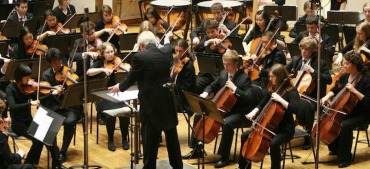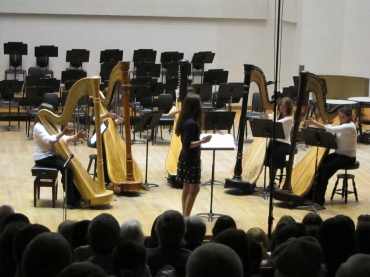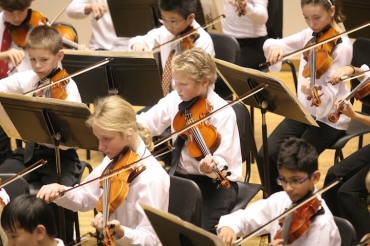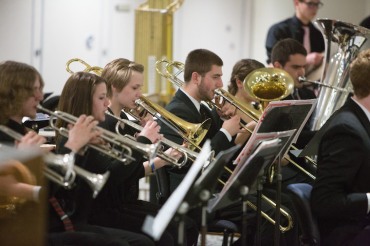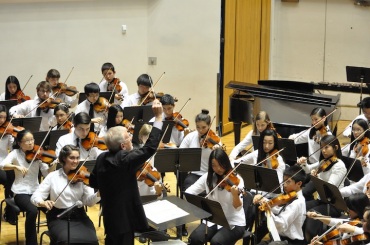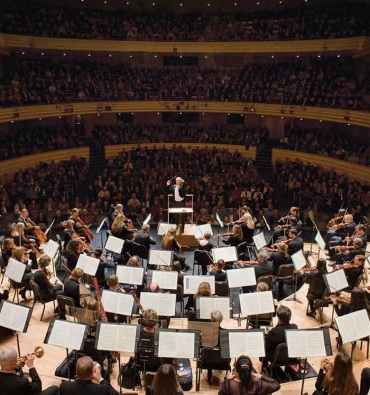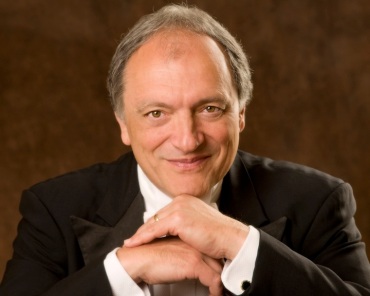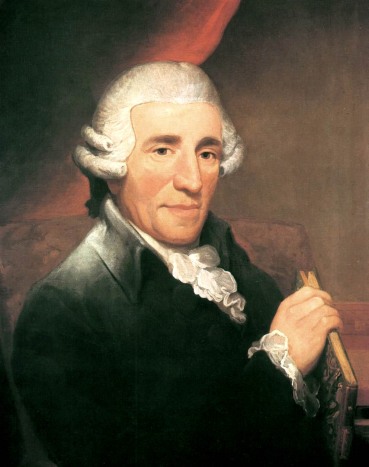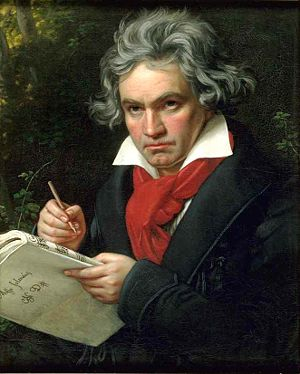The Well-Tempered Ear
Classical music: The Oakwood Chamber Players open their new season with three concerts this weekend that feature music by Chick Corea, Bruce Broughton, Alexander Arutiunian and others
Leave a Comment
By Jacob Stockinger
The Oakwood Chamber Players (below) officially begin their 2017-2018 season series with the theme “Journey” this coming weekend with a concert titled Departure on Saturday, Sept. 9, at 7 p.m. and Sunday, Sept. 10, at 2 p.m.
However, the Oakwood Chamber Players will also present a special performance at Bos Meadery (below), 849 E. Washington Ave., on this Friday night, Sept. 8, from 7 to 8:30 p.m. in a range of music choices that will include excerpts from the Departure concert along with a breadth of other styles of music. Donations will be accepted.
The two full-length concerts will both be held at the Oakwood Center for Arts and Education, 6209 Mineral Point Road, on the far west side of Madison near the West Towne Mall.
Guest artists pianist Joseph Ross, violist Sharon Tenhundfeld (below top) and violinist Maureen McCarty (below bottom) will join members of the Oakwood Chamber Players to launch their season.
Tickets can be purchased with cash or personal checks (no credit cards) at the door: $25 general admission, $20 seniors and $5 students.
For tickets and more information, go to www.oakwoodchamberplayers.com or call (608) 230-4316.
According to a press release, “Departure will explore composers’ musical journeys as influenced by shifts in their artistic lives.
“Just two years after the start of his huge success in the expanding world of jazz-fusion, with renowned hits such as “Spain,” American composer and pianist Chick Corea (below) wrote his Trio for flute, bassoon and piano in 1973.
“He created a fascinating blend — a classical style that both reflects his personal jazz-like fluidity at the keyboard but also transfers the sense of conversational-like interactions that occurs between players. (You can hear Chick Corea’s Trio in the YouTube video at the bottom.)
“This succinct piece is infused with the composer’s essential and recognizable artistic voice. Corea bridges the boundary between genres in an artful and engaging way, creating a brief snapshot of two artistic worlds joined through the piece’s synergy.
“Academy Award-winning and Emmy award-winning film composer Bruce Broughton (below) has consistently contributed to the world of chamber music literature. Broughton’s successes in the film industry include Young Sherlock Holmes, Silverado and The Rescuers Down Under.
“His Primer for Malachi, for flute, clarinet, cello and piano, was written in anticipation of the birth of a grandchild in 1997. Through its five short movements the piece creates a programmatic feel. It begins with quiet introspection, progressing through each movement with increasing rhythmic and melodic intensity, peaking with an action-packed instrumental musical tag, and concluding by musically catching its breath, slowing in the final movement to calm and flowing lines, mirroring the opening effect.
“Known for his emotive melodies Armenian-Soviet pianist and composer Alexander Arutiunian wrote prolifically for orchestra, chamber music and film.
“Written in Armenia after spending several years in Moscow, the Concert Waltz for winds and piano is taken from his 1958 film score for the movie “About My Friend.” It is a wry waltz set in a minor key, and the composer infuses the familiar waltz dance form with a tongue-in-cheek sense of being on a slightly careening carousel. The piece sparkles with Armenian folk flavor and the energy is captivating.
“The Kaiserwaltz by Viennese composer Johann Strauss musically conjures up the grandeur of the ballroom. The piece was intended to symbolize ‘a toast of friendship’ between Germany and Austria. The waltz is full of upbeat musical declarations and graceful melodies.
“The Oakwood Chamber Players were pleased to discover that the piece had been reimagined from its full orchestral orchestration, written in 1889, to this delightful version, arranged in 1925 for chamber ensemble by Arnold Schoenberg (below). The grace of this music is refined and enduring.
“German composer and organist Max Reger’s perspective on compositional artistry was informed by the masters who came before him.
“However, perpetually fascinated by fugues, Reger (below) often wrote pieces that were very abstract. He worried about the lasting reputation of penning these kinds of ultra-academic compositions. He was an ardent admirer of Bach, Brahms and Beethoven and was very capable of writing a range of styles that were both accessible and rooted in the historic perspectives.
“In his Serenade for flute, violin, and viola, written just a year before his death, he sought to show the range of his compositional capabilities and to silence critics by leaving more approachable music for posterity. At this pivotal time he reached his goal ably, giving the performers an outstanding piece with nimble rhythms, memorable melodies, and the bright voicing of an upbeat sound palette.”
This is the first of five concerts in the Oakwood Chamber Players’ 2017-2018 season series entitled Journey. Remaining concerts will take place on Nov. 26; Jan. 13 and 14; March 10 and 11; and May 19 and 20.
The Oakwood Chamber Players are a professional music ensemble proudly supported by Oakwood Lutheran Senior Ministries and the Oakwood Foundation.
Tags: academic, Academy Award, action, admission, Alexander Arutiunian, Appalachian Journey, Armenian, Arnold Schoenberg, arrangement, artistic, Arts, Austria, Bach, ballroom, Bassoon, Beethoven, Bos Meadery, boundary, Brahms, brass, bridge, Bruce Broughton, Carousel, cash, Cello, Chamber music, check, Chick Corea, clarinet, Classical music, composer, conversation, counterpoint, credit card, critic, dance, declaration, departure, donation, Emmy award, energy, ensemble, Film score, fiom, flavor, fluyte, folk, friendship, fugue, genre, grace, grandchild, grandeur, historical, hit, hits, Horn, industry, instrument, instrumental, interaction, Jacob Stockinger, Jazz, Johann Strauss, Johann Strauss II, Kaiser waltz, Kaiserwaltz, key, Keyboard, Lutheran, Madison, Madison Symphony Orchestra, Max Reger, melody, ministry, minor key, Moscow, movement, movie, movie music, Music, Music industry, Oakwood Chamber Players, Oakwood Village, Orchestra, orchestration, Oscar, palette, perspective, Pianist, Piano, piece, posterity, professional, programmatic, rhythm, Silverado, snap[shot, Soviet, Spain, style, succinct, symphony, synergy, The Rescuers Down Under, ticket, toast, trio, United States, University of Wisconsin-Madison School of Music, University of Wisconsin–Madison, upbeat, version, Vienna, Viola, Violin, violinist, violist, voice, Waltz, West Towne Mall, winds, Wisconsin, Young Sherlock Holmes, YouTube
Classical music: The Oakwood Chamber Players announce their new season with the theme of “Journey”
Leave a Comment
By Jacob Stockinger
Over many years, the Oakwood Chamber Players (below) have built a solid reputation for programming unusual composers and neglected works, all performed with first-rate playing.
(You can sample their recording for Naxos Records of a work by UW-Madison graduate Daron Hagen in the YouTube video at the bottom.)
The new 2017-018 season, based on aspects of a JOURNEY is no exception.
Except where noted, performances are on Saturday at 7 p.m. and Sundays at 2 p.m. at Oakwood University Woods Center for Arts and Education, 6201 Mineral Point Road, on Madison’s far west side, not far from West Towne Mall.
The group writes:
“Join the Oakwood Chamber Players on our 2017-2018 season journey with composers whose music encompasses the animation and anticipation at departure and beyond. We’ll have something for adventure seekers as they consider the view over the ever-expanding horizon.
“We’ll stop over to stay a while with friends and see the future with those who forever influence the musical landscape. We will welcome both familiar and new faces as guest artists this season. Come along with us on the JOURNEY!”
JOURNEY
DEPARTURE
September 9/10, 2017
Strauss-Schoenberg Kaiser-Walzer for mixed ensemble
Reger Serenade for flute, violin and viola
Arutiunian Concert Waltz for winds and piano
QUEST
November 26, 2017 (1 and 3:30 p.m.)
Blake Snowman Suite for string quartet
Mozetich Angels in Flight for mixed ensemble
Rutter Brother Heinrich’s Christmas for vocal quartet, narrator and mixed ensemble
HORIZON
January 13/14, 2018
Casella Serenade for mixed ensemble
Mikulka Sunset 1892 for clarinet, viola and piano
Huber Quintet for winds and piano
SOJOURN
March 10/11, 2018
Hofmann Octet for mixed ensemble
Schoenberg Presto for string quartet
Scott Cornish Boat Song for piano trio
Mendelssohn Concert Piece for clarinet, bassoon and piano
LEGACY
May 19/20, 2018
Kaminski String Quartet
Smit Sextet for wind quintet and piano
Sekles Capriccio – Yankee Doodle con variazioni for piano trio
2017-2018 Season Ticket Prices
Senior (62+) Single: $20 per concert
Senior (62+) Series: $85 for the season*
Adult Single: $25 per concert
Adult Series: $105 for the season*
Student Single: $5 per concert
*Season concert series offers five concerts at a 15% discount. Tickets available at the door.
The Oakwood Chamber Players now accept payment via credit card as well as cash and check.
For more information, go to: https://www.oakwoodchamberplayers.com
Tags: adult, adventure, Alexander Arutiunian, angel, animation, anticipation, artist, Arts, Blake, boat, Capriccio, Casella, cash, Cello, Chamber music, check, choral music, Christmas, clarinet, Classical music, Compact Disc, composer, Concert, Cornish, credit card, Daron Hagen, departure, discount, Doodle, Education, ensemble, face, flight, flute, guest, Hofmann, Holiday, horizon, Huber, Jacob Stockinger, journey, kaiser, Kaminski, landscape, legacy, Madison, man, Mendelssohn, Mikulka, Mozetich, Music, musical, narrator, Naxos, Oakwood Chamber Players, Oakwood Village, Octet, Piano, Piano Trio, Quartet, quest, quintet, recording, Reger, Rutter, Schoenberg, Scott, seeker, Sekles, senior, Serenade, Smit, snow, snowman, sojourn, Sonata, song, Strauss, String quartet, Student, sunset, theme and variations, tickets, trio, United States, University of Wisconsin-Madison School of Music, University of Wisconsin–Madison, variations, Viola, Violin, vocal music, Waltz, West Towne Mall, winds, Wisconsin, work, Yankee, Yankee Doodle, YouTube
Classical music education: The University of Wisconsin–Madison School of Music ranks in the nation’s Top 30 overall and in the Top 10 for music education. Plus, WYSO’s Youth Orchestra and Concerto Competition winners perform Beethoven, Schubert, Walter Piston and Alexander Arutiunian on this Saturday afternoon.
5 Comments
ALERT: Just a reminder that this Saturday afternoon, the top-ranked Youth Orchestra (below) of the Wisconsin Youth Symphony Orchestras (WYSO) will perform under conductor James Smith at 1:30 p.m. in Mills Hall on the University of Wisconsin-Madison campus in the Mosse Humanities Building, 455 North Park Street.
The program includes: The Suite from “The Incredible Flutist” by Walter Piston; and the first and second movements of the Symphony No. 8 “Unfinished” by Franz Schubert.
Also included are the winners of the WYSO Concerto Competition. Trumpeter Noah Mennenga will perform the Trumpet Concert by Alexander Arutiunian. Pianist Theodore Lau will play the third movement of the Piano Concerto No. 3 in C Minor, O;. 37, by Ludwig van Beethoven.
Admission is $10 for adults, $5 for young people 3-18. For more information, call (608) 263-3320 or visit http://wyso.music.wisc.edu/dianne-endres-ballweg-winterfest-concert-series/
By Jacob Stockinger
Spring Break starts tomorrow at the University of Wisconsin-Madison.
So The Ear wants students and faculty to leave on a positive note and then return with renewed energy and dedication, knowing that the UW-Madison School of Music still ranks relatively high (No. 24) among the nation’s top 30 public and private schools for overall programs and even higher (No. 10) for music education in an informal blog survey.
To be sure, the UW-Madison School of Music is facing a lot of complex challenges.
Those challenges range from finding enough scholarship money to compete in recruiting outstanding students to finding enough money to recruit and retain outstanding faculty.
And some of the challenges look to be made worse through budget cuts and policy changes proposed by the Republican-dominated legislature and Republican Gov. Scott Walker (below), though we will have to wait to see the final outcomes.
But the politicians sure are sending out signals that they want to treat the world-class university more like a trade school than a star player in the liberal arts, the arts and the humanities. They just don’t see those fields as adding much to economic development.
As if economic development is the bottom line for everything of personal and social value.
And as if the so-called STEM subjects -– science, technology, engineering and math – are the only relevant academic fields for the public to support.
Besides, study after study shows the relevance of music education to success in other fields. (Below are the UW Symphony Orchestra and UW Choral Union.)
So before anyone starts fooling around and making major changes and cuts, it is good to be reminded of what a precious educational, cultural and economic resource the UW-Madison remains, as a world-class learning institution.
But it won’t take much negligence or wrong-headed tinkering for the UW to drop out of the ranking.
So here they are to read and then think about how to best protect the great university that the state of Wisconsin has.
First comes the overall ranking (No. 24) among private and public Schools of Music, which, if The Ear recalls correctly, has dropped over the past decade:
And then comes the ranking (No. 10) in the specific area of music education in a less prestigious blog poll done by an individual:
http://musicschoolcentral.com/top-10-colleges-music-education-majors-us/
Thoughts, anyone?
The Ear wants to hear.
Tags: Alexander Arutiunian, Arts, Beethoven, Chamber music, choral music, Classical music, concerto, conductor, Franz Schubert, Jacob Stockinger, Ludwig van Beethoven, Madison, Music, Music education, opera, Orchestra, Piano, Piano concerto, Schubert, Scott Walker, state legislature, Trumpet, trumpet concerto, University of Wisconsin-Madison School of Music, University of Wisconsin–Madison, vocal music, Wisconsin, Wisconsin Youth Symphony Orchestras, WYSO
Classical music: Is this the minority report of a dissenter? The Ear offers some thoughts and after-thoughts from recent concerts by the Madison Symphony Orchestra, the Wisconsin Chamber Orchestra, the Pro Arte String Quartet, the Middleton Community Orchestra and pianist Christopher Taylor. Plus, here are links to rave reviews of this afternoon’s final all-Beethoven concert by pianist Yefim Bronfman and the Madison Symphony Orchestra.
1 Comment
ALERT: Today at 2:30 p.m. in Overture Hall of the Overture Center is the final performance of the all-Beethoven concert by the Madison Symphony Orchestra under John DeMain. It features pianist Yefim Bronfman (below) in TWO piano concertos (Nos. 2 and 5 “The Emperor”) plus the Symphony No. 1 and “The Creatures of Prometheus” Overture. Here are links to two rave reviews of the concert by Madison Magazine critic and blogger Greg Hettmansberger and by Isthmus critic John W. Barker, who also guest blogs for The Ear. It sure sounds like a NOT-TO-BE-MISSED concert. See you there!
http://www.thedailypage.com/daily/article.php?article=42237
By Jacob Stockinger
It has been a very busy time musically in Madison, with a lot of previews to post, which often supplant reviews since The Ear thinks previews are more useful than reviews to most listeners and performers. And this coming week and weekend are even worse. So much music, and so little space!
But here are some “outdated” capsule reviews, impressions really, with accompanying afterthoughts that come to The Ear as he listened and later thought about what he had heard:
MADISON SYMPHONY ORCHESTRA AND TRUMPETER TINE THING HELSETH
It seemed a curious, even odd theme for a Valentine’s Day program. But BRASS – not romantic love — marked the Valentine’s Day weekend performances by the Madison Symphony Orchestra (below), although ending with the “Rosenkavalier” suite by Richard Strauss did indeed prove an inspired choice to combine brass and love. Plus by all accounts, the concert sold very well. It sure got standing ovations. In short, it may have seemed odd, but it worked.
The “Doctor Atomic” Symphony by the contemporary American composer John Adams (below), who put the instrumental work together from his own opera score, was powerful, and also fit the brass bill, with great solos by MSO trumpeter John Aley, and was impressive to hear –- though also hardly romantic.
Given conductor John DeMain (below) and his stupendous taste and talent for choosing great singers who are also affordable, I kept thinking: How I would like to have heard some great singers perform familiar and unknown love arias from operas by Mozart, Rossini, Verdi, Puccini, Saint-Saens, even Wagner. Now those would be symphony tickets to throw in with a box of chocolates and a bouquet of roses. But The Ear has been informed that such concerts often do not sell well and might also be seen as competing with the local opera company.
All that said, I thought that the guest soloist, Norwegian trumpeter Tine Thing Helseth (below), proved an inspired, if unexpected, choice. She showed an uncanny power for playing softly. Brass instruments are not easy to control with little breath and with soft tone. But she did both beautifully in two concertos by Franz Joseph Haydn and Alexander Arutiunian. She clearly has the lung power to blow down the Walls of Jericho. But what impressed and seduced me was her quietness, which nonetheless possessed rich tone and unwavering pitch. That is a rare talent, and one to be cherished — and brought back to Madison!
Maestro Andrew Sewell (below) has a never-failing knack of finding terrific music that has been overlooked but is actually very good, if not revolutionary or pioneering.
Sure, at his last concert I too, like the rest of the audience, loved what he did with the Jupiter Symphony of Mozart –- not too hectic, clear voicing, propulsive energy even with all the repeats. And the talented and congenial soloist Joshua Roman proved an irresistible highlight in Haydn’s Cello Concerto in D major.
But the real surprise of the night was the 20th-century Concerto Grosso by Vittorio Giannini (below), who taught composition at the Juilliard School and the Manhattan School of Music and then established the North Carolina School of the Arts. What a discovery! I want to hear more by this guy.
And Sewell will soon unwrap another surprise this week –- and I expect, as usual, that it will be modern music that is accessible and tuneful, not R&D Music (that’s short research and development) that sounds like jet noise or broken plumbing. Could that help explain why he gets full houses?
Sewell and the WCO will probably do so again THIS COMING FRIDAY NIGHT at 8 p.m. in the Capitol Theater of the Overture Center. That is when he and the Wisconsin Chamber Orchestra combine the famous famously listenable and lovely Violin Concerto (with guest soloist Karina Canellakis) by Felix Mendelssohn and Franz Joseph Haydn’s “Clock” Symphony (Symphony No. 101 of his 104 symphonies) with “Elements” by American composer Michael McLean (below, and with a sample of “Elements” in a YouTube video at the bottom). Sounds like another MUST-HEAR concert to The Ear.
PRO ARTE QUARTET
Well, the headlines and chit-chat went rightfully to the world premiere of Belgian composer Benoit Mernier’s commissioned String Quartet No. 3, which sounded fiendishly difficult and seemed based largely on technical stuff like trills, tremolos and glissandos instead of themes and infectious rhythms. And the Pro Arte Quartet, artists-in-residence at the University of Wisconsin-Madison School of Music since 1940 and celebration its centennial, played it with impressive aplomb and apparent ease.
“Do you like the music?” someone asked me right after the performance.
I think the better question is: “Does the music like me?”
Think about it: What is the composer’s responsibility to you the listener, and what is your responsibility to the composer (Mernier, below), especially if he seems to ignore you?
I also loved the rarely heard and beautifully performed viola quintet by Anton Bruckner and particularly the contrasts between Sally Chisholm’s viola and Samuel Rhodes’ viola (the two are below side-by-side). If you liked the combination –- and what is not to like with the darker hued voice of the viola –- be sure to try the viola quintets by Mozart and Brahms, which I would also like to hear the Pro Arte do more of.
But for old-fashioned me, the star of the evening was the Haydn Quartet, Op. 20, No. 4. It just cleaned out your ears and was proof again that, at its best, the genre is indeed still as it was described by Haydn himself when pretty much invented in the 18th century: A conversation of equals. And did the Pro Arte ever play it with accuracy, clarity and texture. It sparkled like a diamond. The string quartet may have evolved, changed or morphed over the centuries, but it has simply not gotten any better than Haydn.
So: Is there any chance that we night get of a multi-year Haydn cycle by the Pro Arte, which decades ago in another avatar or configuration of players started to record the complete Haydn quartets in the famous Abbey Road studio in London for RCA. They have done Beethoven and Shostakovich cycles. What about Papa Haydn? And if not a complete cycle of the 68 or so quartets, how about a fairly comprehensive survey or at least a very large sampler of Haydn’s early, middle and late styles?
PIANIST CHRISTOPHER TAYLOR
What more can you say about the award-winning, audience-approved star talent pianist Christopher Taylor (below) who teaches at the University of Wisconsin-Madison School of Music and concertizes around the world, and his stunning solo recital this year?
I loved the “War” Sonata No. 6 by Sergei Prokofiev, a great piece that he performed greatly with both riveting energy and heartbreaking lyricism. I also loved the encore — Scott Joplin’s “Pineapple Rag” –- as a contrast and change of pace.
But I have to be honest: I have heard enough of the Liszt piano transcriptions of Beethoven’s symphonies. Trust the genuine original! Accept no substitutes!
The next day I listened to a recording of the same work by a real orchestra — the Gewandhaus Orchestra of Leipzig under conductor Riccardo Chailly. What a difference when the “Eroica” is played with real brass countering, with jarring dissonance, real strings; when it is real tympani drumbeats rather than bass tremolos on the piano. Ludwig (below) simply had more of IT – whatever musical genius is — than Franz.
The real “Eroica” Symphony doesn’t — and shouldn’t — sound so much like a Hungarian Rhapsody or a Transcendental Etude. In their day, these transcriptions served a purpose and they stretched the resources of the piano, or at least, of pianists. Now, they strike The Ear as precious, more of a sideshow of amazing and ingenious pianism and not much little else aside from some strokes of minor genius here and there by the Paganini of the Piano.
From one of those transcriptions I learned something and I enjoyed it. But now that makes three down (symphonies numbers 3, 4 and 5) for Taylor. I, for one, sure hope we don’t have the other six to go. How much more I would have preferred to hear this supremely talented pianist and gifted musician in some serious and original piano repertoire –- maybe a late Schubert sonata, or a Bach partita, or a Chopin ballade, or a Schumann cycle. I want to hear Christopher Taylor in something that puts depth over display, substance over style.
Am I alone in that wish?
MIDDLETON COMMUNITY ORCHESTRA
Guest reviewer John W. Barker covered this recent concert of the mostly amateur Middleton Community Orchestra (below), which featured music by Nikolai Rimsky-Korsakov, Johannes Brahms and Wolfgang Amadeus Mozart, thoughtfully and thoroughly for this blog.
All I would add is a lesson that every teacher knows: Students with lesser abilities rise to meet high expectations. That is why symphony orchestras and chamber orchestras should book the best soloists they can get and afford: The Ear is convinced that the level of playing and performing usually rises to match the soloist and fosters cohesion.
With the MCO, it was two lifelong friends and award-winning, UW-Madison trained string players -– violinist Eleanor Bartsch and violist Daniel Kim (below) who soloed and who seemed in complete synch, down to the timing of their trills, during Mozart’s sublime Sinfonia Concertante.
Their playing was superb, and the amateur orchestra rose to meet them and give them the beautiful support they deserved. And with Mozart there is no place to hide, so flaws or mistakes are quickly revealed.
Well, now it is on to another busy week of concerts.
Where, I wonder, will the music lead The Ear this time?
Tags: Alexander Arutiunian, amateur, Anton Bruckner, arias, Arts, Beethoven, Belgium, Benoit Mernier, brass, Cello, Cello Concerto, Chamber music, chamber orchestra, Claudio Monteverdi, community orchestra, concerto, conductor, Creatures of Prometheus, Doctor Atomic, Eroica Symphony, Felix Mendelssohn, Finlandia, Friday, Gewandhaus, Giacomo Puccini, Haydn, Jacob Stockinger, Jean Sibelius, Johannes Brahms, John Adams, John DeMain, Joseph Haydn, Joshua Roman, Juilliard School, Leipzig, Leipzig Gewandhaus, Love, Ludwig van Beethoven, Madison, Madison Opera, Madison Symphony Orchestra, Manhattan School of Music, Michael McLean, Mozart, Nikolai Rimsky-Korsakov, North Carolina School of the Arts, Orchestra, Overture, Overture Center, Piano, Piano concerto, Pro Arte Quartet, Puccini, Riccardo Chailly, Richard Strauss, Rossini, Saint-Saens, Samuel Rhodes, Scott Joplin, Sergei Prokofiev, singer, String quartet, string quintet, symphony, Tine Thing Helseth, transcription, Trumpet, University of Wisconsin-Madison School of Music, Valentine's Day, Verdi, Viola, viola quintet, Violin, Violin concerto, Vittorio Giannini, vocal music, Wisconsin Chamber Orchestra, Wolfgang Amadeus Mozart, Yefim Bronfman, YouTube
Classical music Q&A: Norwegian trumpeter Tine Thing Helseth discusses being a female brass player and her program with the Madison Symphony Orchestra this weekend.
1 Comment
ALERT: Blog friend Rich Samuels writes: “At 7:22 a.m. on this Thursday morning, my classical music show “Anything Goes” that is broadcast weekly from 5 to 8 a.m. on WORT-FM 89.9 will be airing an interview with Norwegian trumpet soloist Tine Thing Helseth, who will be in Madison for concerts this weekend with the Madison Symphony Orchestra and a master class at the UW-Madison School of Music (see more below). Listeners can hear a sampling of her solo work as well as a performance by tenThing, her all-female Norwegian brass ensemble. Tune in to 89.9 FM.
By Jacob Stockinger
As he tells the story, Madison Symphony Orchestra’s longtime music director and conductor John DeMain was riding in his car and listening to Sirius XM radio. He heard a new recording by a terrific trumpet player and he was so impressed that he determined then and there that he would try to book her for a Madison concert — especially since most soloists he books are pianists, string players or singers.
Her name in Tine Thing Helseth (below), and DeMain succeeded. He booked her for a debut that will take place in Madison this weekend.
Helseth is young, energetic and articulate. She is also generous with her time and talent. In fact she will give master class for trumpet and brass players with the Wisconsin Youth Symphony Orchestras and a FREE public master class at the UW-Madison School of Music at 1:30 p.m. in Mills Hall on this Thursday, Feb. 13.
Then come her MSO concerts, which she will perform under the baton of DeMain in Overture Hall on Friday night at 7:30 pm.; Saturday night at 8 p.m.; and Sunday afternoon at 2:30 p.m.
Helseth will perform Franz Joseph Haydn’s well-known Trumpet Concerto in D Major and Alexander Arutiunian’s lesser known Trumpet Concerto in A-Flat Major (1920).
Rounding out the program is Jean Sibelius’ powerful and popular tone poem “Finlandia”; the symphonic suite from John Adams’ opera about physicist Edward Teller and the A-Bomb called “Dr. Atomic”; and the luscious late Romantic suite from Richard Strauss’ opera “Der Rosenkavalier,” a perfect offering for Valentine’s Day weekend.
A prelude discussion by musicologist Susan Cook, the new director of the University of Wisconsin School of Music, will take place in Overture Hall one hour before each curtain time.
Tickets are $8.25-$82.50 with rush tickets and discounts available. They can be purchased at the Overture Center box office, 211 State St., or by calling (608) 258-4141 or by visiting:
http://www.madisonsymphony.org/helseth
Here is a link to the MSO’s program notes, written superbly as always by trombonist J. Michael Allsen who also teaches at the University of Wisconsin-Whitewater:
http://facstaff.uww.edu/allsenj/MSO/NOTES/1314/5.Feb14.html
Helseth recently granted an email interview to The Ear:
Can you briefly introduce yourself, and tell us when and how you started studying music? How did you get into brass and what attracted you to brass and specifically the trumpet?
I started to play the trumpet when I was seven years old, basically because my mother plays the trumpet. I had played piano a couple of years already, but from the first moment the trumpet felt like my best friend — and we’ve stayed that way ever since! My mum had a good friend who played in the Norwegian Opera Orchestra, and she became my first teacher. I also played in my school band.
Do you find that being a woman plays any role, positive or negative, in your career or reception as a world-class trumpet player?
The most important thing as a performer will always be if you have something to say. Nothing else really matters.
But, that being said, I do feel comfortable with the fact that for some it might be a bit rare to see a woman having my profession. I feel a responsibility to show all the young kids out there that you can pick up whatever instrument you feel like, and make it your voice. Stereotypes can be boring. Just listen to your inner voice and follow your heart.
(Here is a link to a more extensive answer she gave about the issue of gender and sex roles in another interview:
What would you like to tell the audience about the Trumpet Concerto by Haydn (below)?
Franz Joseph Haydn’s trumpet concerto is basically the most famous concerto for my instrument. This year marks my very own 10-year anniversary for the first time I played it with a professional orchestra. I was 16 and it was with the Bergen Philharmonic in Norway.
This piece will forever have a truly special place in my heart. I play it several times a year, but I never get tired of it. There are always new things to discover, new colors and voices in the orchestra. It’s a true chamber music work, and I absolutely love performing it. (And she performs it very well. You can hear the final movement at the bottom in a YouTube video that has drawn more than 3.3 million hits.)
What would you like the audience to know about the Trumpet Concerto by Alexander Arutiunian (below)?
It’s very romantic in style, with clear folk music elements and the harmonics reveals that it’s written in the middle of the 20th century. It reminds me a bit of Khachaturian. It has beautifully melodic material and a really catchy fast theme.
These concerts mark your debut in Madison, perhaps even Wisconsin and the Midwest? Is there anything special you want to say about the city, the Madison Symphony Orchestra, conductor John DeMain or the rest of the program (Jean Sibelius, John Adams and Richard Strauss)?
I am just very much looking forward to coming to Madison and working with the orchestra and Maestro DeMain, and to meeting the audience. As a performer I live for the communication with the musicians I work with and with the audience. It’s always exciting to come to new places and communicate with music.
Tags: Alexander Arutiunian, Aram Khachaturian, Arts, brass, Classical music, concerto, Der Rosenkavalier, Doctor Atomic, Finlandia, Franz Josef Haydn, Haydn, Jacob Stockinger, Jean Sibelius, John Adams, John DeMain, Joseph Haydn, Madison, Madison Symphony Orchestra, master class, Norway, opera, Orchestra, Overture Center, Overture Hall, Piano, Rich Samuels, Richard Strauss, Sirius XM Radio, soloist, symphony, Tine Thing Helseth, tone poem, Trumpet, University of Wisconsin–Madison, WORT-FM 89.9, YouTube











